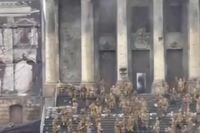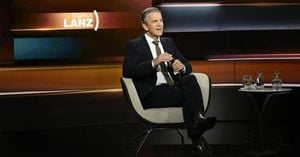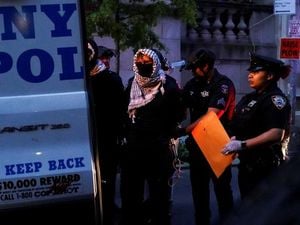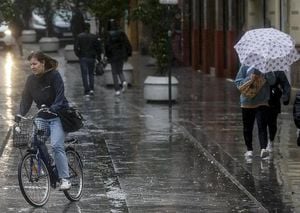In a striking display of historical reenactment, Russia has constructed a life-sized replica of the Reichstag building in Moscow, intended for its annual Victory Day celebrations. This initiative is meant to commemorate the Soviet Union's capture of the German parliament during World War II, a pivotal moment marked by the raising of the Soviet flag atop the building. The replica, situated in an amusement park, is designed to recreate the atmosphere of that historic event, complete with bullet holes, rubble, and authentic military vehicles from the era.
The play, aptly named "Victory!", is set to run twice daily throughout May, coinciding with the grand Victory Day parade that honors the Soviet victory over Nazi Germany. This year’s celebrations are particularly poignant, as they come amid contemporary geopolitical tensions, including Russia's ongoing conflict in Ukraine.
Constructed by filmmakers with ties to the Kremlin, the replica serves not only as a nostalgic reminder of past glories but also as a tool for contemporary political messaging. Russian President Vladimir Putin has framed the current military actions in Ukraine as a necessary "denazification" effort, asserting that the country must rid itself of fascist influences. Ironically, this narrative contrasts sharply with the history of the Reichstag's capture.
Alexei Berest, the Soviet soldier known for raising the flag at the Reichstag, was actually a Ukrainian, supported by a Georgian comrade. Despite his role in this iconic moment, Berest faced post-war marginalization, allegedly due to his heritage. This historical nuance raises questions about the contemporary Russian narrative surrounding nationalism and identity.
The construction of the Reichstag replica and the surrounding events highlight the interplay between history and modern political rhetoric in Russia. As the nation prepares to celebrate its past victories, the implications of these reenactments resonate deeply in the context of current conflicts and national identity.
Victory Day, celebrated annually on May 9, marks the anniversary of the Soviet Union's victory over Nazi Germany in 1945. It is a day of national pride, filled with parades, military displays, and various commemorative events across Russia. The decision to build a replica of the Reichstag underscores the importance of this historical moment in the Russian consciousness.
As the play "Victory!" unfolds, audiences will witness a dramatization of the events leading to the flag's raising, providing a vivid reminder of the sacrifices made during the war. The inclusion of period-accurate military vehicles and the attention to detail in the replica's design aim to immerse viewers in the historical narrative.
However, the political undertones of this reenactment cannot be overlooked. Putin's administration has been known for its efforts to reshape historical narratives to fit contemporary agendas. By emphasizing the theme of denazification, the Kremlin seeks to draw parallels between past and present, framing the conflict in Ukraine as a continuation of the fight against fascism.
Critics of this narrative point out the selective memory at play, arguing that the complexities of history are often oversimplified for political gain. The story of Alexei Berest serves as a poignant reminder of the multifaceted nature of history, where individual contributions can be overshadowed by broader political narratives.
As the world watches Russia's Victory Day celebrations, the juxtaposition of historical pride and modern conflict raises important questions about how nations remember their pasts and the stories they choose to tell. In a time of heightened tensions, the reenactment at the amusement park in Moscow stands as a testament to the enduring power of history in shaping national identity.
In addition to the theatrical performance, the replica of the Reichstag will serve as a focal point for discussions surrounding the nature of remembrance and the role of history in contemporary society. As audiences engage with the reenactment, they will be prompted to reflect on the lessons of the past and their implications for the present.
Ultimately, the construction of the Reichstag replica and the associated events encapsulate a moment of reflection for Russia, blending historical commemoration with modern political narratives. As the nation prepares to honor its past, the complexities of its history and the motivations behind its retelling will continue to shape the discourse surrounding national identity and memory.
As May unfolds and the performances of "Victory!" begin, the eyes of the world will be on Moscow, watching how Russia chooses to engage with its history and the messages it conveys through this elaborate reenactment. In a world where history is often contested, the significance of such events cannot be understated.




